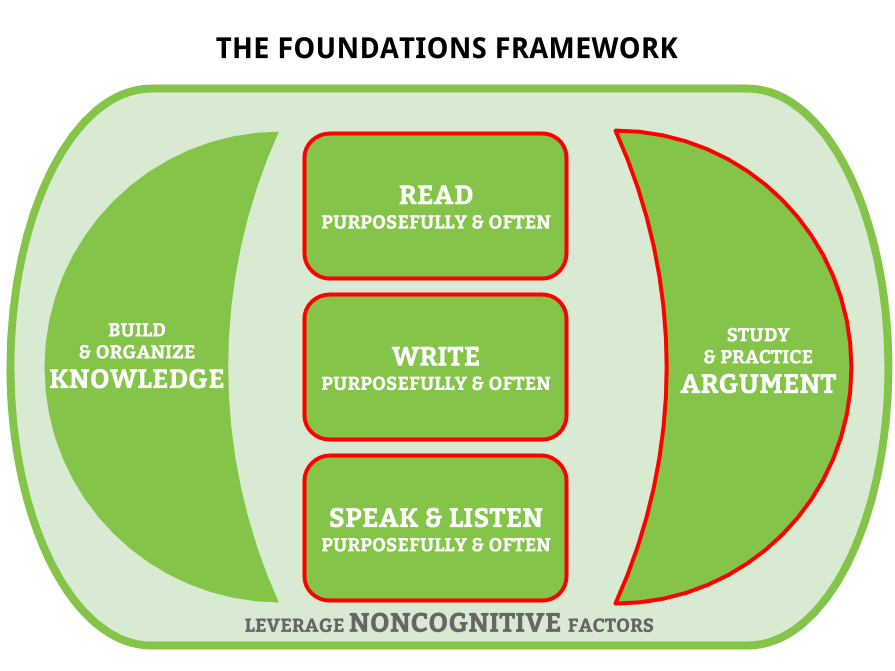For four out of six elements of the “Non-Freaked Out” Foundations Framework, the gist of our strategy is “quantity, then quality.” Those four elements are outlined in red below:
If we want students to improve as arguers, then first we've got to increase the amount of arguing they do — shockingly, I recommend pop-up debates. Only then do we expect to make argumentative skill significantly better. Quality-improvement efforts in argument include refutation work and required tracking.
If we want students to improve as readers, then we start by making sure they're reading as much as possible. This begins simply enough: we quantify how much reading is expected in all courses — including content-area critical “reading to learn” assignments — and then we incrementally improve from there, keeping our eye out for habitual, grading-lite exercises like article of the week. Once this “quantify and increase” mindset is in place across the school, we can improve the quality of that reading with nine simple moves.
If we want students to improve as writers (and we certainly do), then we start by assessing how well our courses match the Pyramid of Writing Priorities. In most courses, provisional writing could be happening on a daily basis with next to no real increase in teacher paperloads. As we work up the Pyramid, we begin improving the quality of student writing through efforts that require no grading and then efforts that maximize useful feedback and minimize time spent grading.
If we want our kids to improve as speakers, we first need to make sure that there's lots of speaking happening. This only takes three strategies: daily Think-Pair-Shares, weekly conversation challenges, and pop-up debates or discussions every other week or so. With these structures in place, we can begin improving student speaking through mini-lessons prior to speaking situations and feedback immediately following speaking situations. To improve listening, Paraphrase Plus helps a lot.
In short, quantity first, quality next. Many efforts for improving student literacy fail because they get the order wrong. When we obsess over quality right away, our kids don't do enough of the things we want them to improve at.
Quantity, then quality.

patrycja says
Dave, thank you very much for the shout-out in your newsletter!
Beyond the pedagogical buzzwords and philosophizing encountered at any teacher PD, I stay internally true to what I know works: “Practice makes perfect.” As you write, if we want our students to become better writers, they must write. If we want our students to become better readers, they must read. If we want our students to become better thinkers, we must make them think– and think often. What a timely reminder as we end the year and begin to plan the next. I will bookmark this page to review the embedded links you have provided.
I will be using your Mechanics Instruction that Sticks package next year, and the pop- up debates. Both seem very promising to solve major problems with grammar and public speaking!